Watermelon might be one of the first treats that come to mind when you think of summer treats. Watermelon is great for parties or by the pool because it is sweet and keeps you cool. These shorts are great for warm weather, but there’s more to them than you know.
Watermelon, or Citrullus lanatus, is a tasty fruit that is low in calories and fat and full of healthy nutrients. The health website Healthline says that you can eat the whole watermelon, even the rind and the seeds.
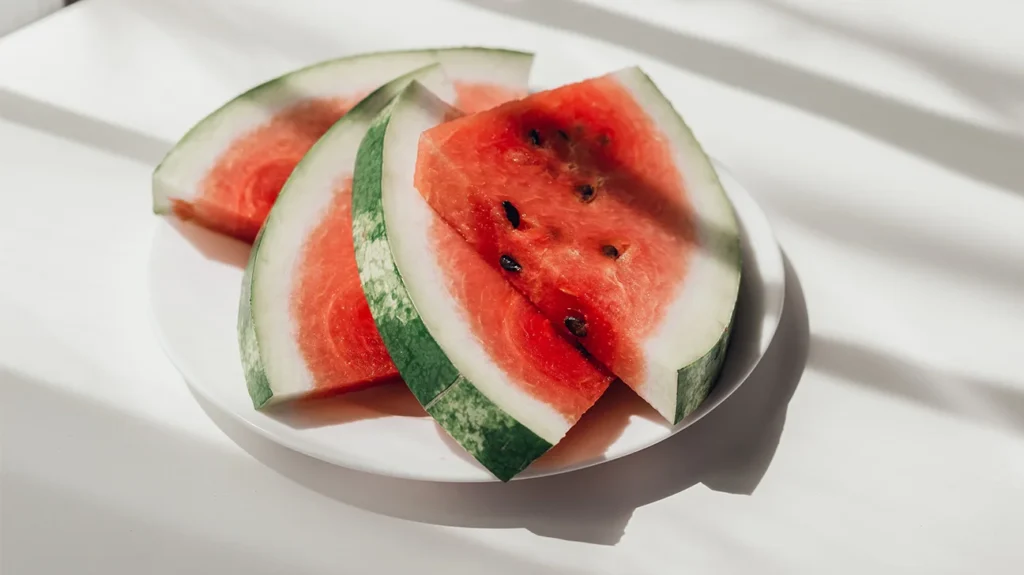
Healthline says that a watermelon is mostly water (92%). There are a lot of lycopene, antioxidants, amino acids, and vitamin A, vitamin B6, and vitamin C in each juicy bite. There is even a small amount of potassium in watermelon.
Angela Lemond, a registered dietitian, nutritionist, and spokesperson for the Academy of Nutrition and Dietetics in Texas, said, “Amino acids are the building blocks of protein, and protein is used in almost every vital function in the body.”
Is watermelon good for you?
Watermelon is good for your health in many ways. It can help with digestion, protect your joints from inflammation, and contain more lycopene than any other fruit. Cancer and heart disease risk goes down when you eat foods that are high in lycopene, an important vitamin. Also, the apple has a lot of beta-carotene, which helps protect the body from free radicals, which are molecules that do damage. “High in fiber, vitamins, minerals, and healthful phytochemicals,” says Carol Johnston, PhD, RD, a nutrition professor at Arizona State University. Phytochemicals help protect DNA from damage and boost the immune system.
The fruit is a great source of vitamin A and vitamin C, according to Karen Collins, MS, a registered dietitian and nutrition advisor for the American Institute for Cancer Research. It also “helps boost potassium and magnesium consumption—minerals that contribute to healthy blood pressure.”
How much sugar is in watermelon?
Even though Johnston says watermelon “satisfies the sweet tooth,” it’s not as sweet as a lot of other well-known vegetables. When you eat one mango, grape, cherry, or pear, you’ll get more sugar than when you eat one watermelon. So it’s best not to eat too much watermelon at once. Each slice has about 17 grams of sugar.
Collins says the fruit’s “natural sweetness” makes it a good choice to mix with other fruits and veggies and “keep salads both healthy and far from humdrum.” It’s often eaten by the slice.
Is it true that watermelon can help you lose weight?
Watermelon is good for you because it is low in calories but still makes you feel full. This makes it a popular food for people who are trying to lose weight. Dietitian Tara Schmidt, who is in charge of the Mayo Clinic Diet, says that watermelon can help people lose weight because it is “high in water, high in fiber, and low in calories.” “Water and fiber are two components of satiety, the feeling of being full,” she explains.
- Get the Daily Briefing sent to your email.
- The most important news of the day, covering everything from movies and sports to politics and events around the world.
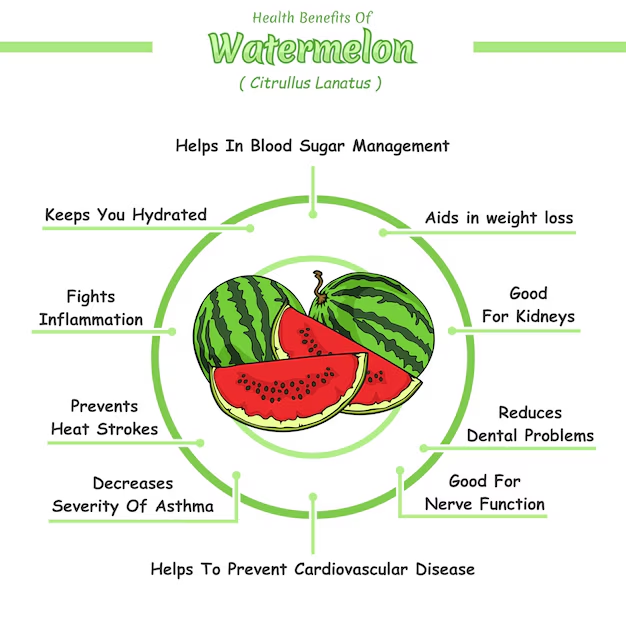
Cut up watermelon in a cup gives you less than 50 calories,.6 grams of fiber, and.9 grams of protein.
People often make fruit water by putting pieces of watermelon in a pitcher of water. This can help “cut down on the temptation to choose sugar-sweetened drinks,” says Collins. “And you can nibble on watermelon chunks from a bowl or platter and feel quite full without unintentionally overdoing it on calories,” she says.
Is it okay to eat fruit every day?
“The standard serving size set by the USDA is twice as big for watermelon as for other fruit,” says Collins. It’s fine to eat a little watermelon every day it’s in season.
Schmidt says the same thing: “You can eat too much of any food,” she says, “but we like to think of fruit consumption as fairly “unlimited” since more than 80% of Americans eat a diet low in fruits and vegetables.” In fact, the Centers for Disease Control and Prevention warn that only 1 in 10 adults get enough fruits and vegetables.
That is, it is better to err on the side of eating too much fruit than not eating enough. Collins still says that watermelon should be eaten with other things. “Trying to fill up on nothing but bowls of watermelon is not leaving room for other foods that provide nutrients you need for overall health,” she says. “But watermelon can be a great partner in shaping eating habits and helping maintain a healthy weight.”
Possible Health Advantages of Watermelon
The current watermelon is very different from the original, but many of its qualities have stayed the same.
Keeps you hydrated
About 91 percent of watermelon is water. Egyptians are said to have put watermelons in royal tombs so that the dead would have a way to get water. Hippocrates, the Greek father of medicine, also suggested watermelon as a way to treat heatstroke. Staying wet is good for your health because drinking enough water helps keep your joints lubricated, your organs working right, and your body temperature in check, among other things. Foods that are high in water, like fruit, can help you meet your daily water goal.
Lowers the blood pressure
Watermelon can help you get rid of extra salt because it makes you pee and has potassium in it. One cup of watermelon has 170 mg of potassium, making it one of the best foods to eat to get the right amount of potassium. The American Heart Association says that guys should get 3,400 mg of potassium every day and women should get 2,600 mg. Potassium helps the body get rid of stored sodium in the urine and lowers blood vessel stress, both of which are important for keeping blood pressure normal.
Watermelon is known for having beta-carotene, but it also has lycopene, which is a different type of carotene. This chemical is found naturally and is only found in watermelons with red skin. Researchers have found that lycopene may help people with high blood pressure and may also help protect against heart disease.
Lowers cholesterol and fights swelling
Some research suggests that watermelon may be a good addition to a plant-based diet for heart health and controlling inflammation. However, more research is needed. According to research, watermelon is one of many foods that are high in antioxidants and may help control cholesterol, high blood pressure, and other heart disease risk factors.
Helps keep skin healthy
A review from 2022 says that antioxidants like the carotenoids in watermelon can help protect skin from free radicals and also help protect skin lipids. This may lower the risk of skin aging too quickly. Other studies also suggested that drinking more water may help improve the hydration and elasticity of the skin, among other things.
What does watermelon do for your sex life?
Some people say that watermelon is “a natural Viagra,” which means that it might help boost your libido and make your sexual health better. The juicy fruit has lycopene, beta-carotene, and citrulline in it, which can help relax blood vessels in a way similar to Viagra[9]. However, keep in mind that there isn’t any peer-reviewed, written research that proves this benefit exists, so more research is needed.
Watermelon: Can it help you lose weight?
Over time, eating whole, fresh fruit instead of prepared foods that are high in sugar can help you lose weight. Apples, berries, and watermelon all have more fiber than watermelon. However, experts still think that watermelon could help you get enough fiber in a day to lower your risk of high cholesterol and make you more regular. But the Mayo Clinic says that fruits like watermelon can also help you feel full because they are mostly water. Whether you’re on a diet or just want to keep your weight the same, watermelon is a healthy snack or side dish.
But watermelon by itself won’t help you lose weight. Making long-term changes to your diet to include more fruits and veggies will help you lose weight and get more of the nutrients you need. You should stay away from fad diets where fruit is the only thing you eat. These diets might help you lose weight for a short time, but you’ll gain it back as soon as you start eating normally again.
If I eat watermelon, is it bad for my health?
Watermelon, on the other hand, doesn’t pose any long-term health risks to most people. Because it is low in calories and high in nutrients, watermelon is a good treat for many people, even those with type 2 diabetes who need to keep an eye on their blood sugar levels.
Oregon State University says that a dose of watermelon has about 12 grams of carbohydrates, even though it has a glycemic index (GI) of 76, which means it is pretty high on the GI scale. The fruit has a low glycemic load (GL) of about 8. This is a scale used to figure out if a food will make your blood sugar go up when you eat a reasonable amount of it. You can find a food’s GL by increasing its GI by the number of carbs in a serving and then dividing that number by 100.
A watermelon allergy is another risk that could happen. Some people who are allergic to ragweed pollen and foods in the gourd family may also be allergic to watermelon. This doesn’t happen very often, but it does happen. Aside from getting a blood test, the only way to be sure if you’re allergic to watermelon is to eat it and then have a bad response the next day. Some signs are redness, swelling, and trouble breathing. Some responses can be so bad that they could kill you.
Other small side effects of watermelon are diarrhea, stomach pain, and an upset stomach. If you’ve eaten too much fruit, this is most likely to happen.
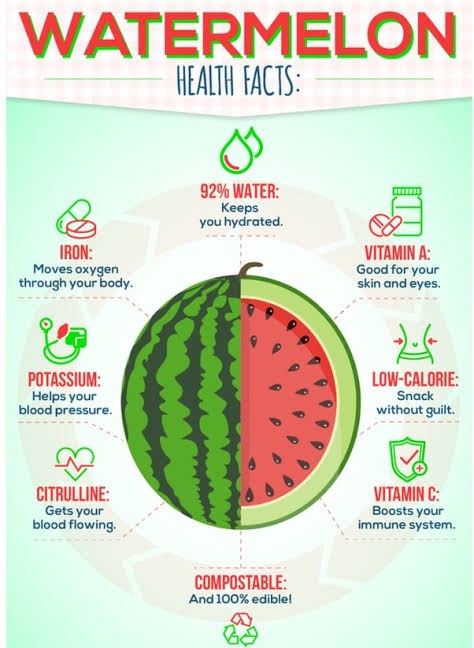
How to Choose Watermelon and Keep It
You can’t see what’s inside a watermelon until you get home and cut it open. This can make shopping for one tricky. As a general rule, though, a watermelon should be heavy. If one seems lighter than the others, it might have lost its water and is now bad. Some mini-watermelons weigh as little as 2.5 pounds (lb), while some of the bigger ones can weigh 44 pounds or more.
The rind gives you more information about how edible a watermelon is overall. First, there shouldn’t be any lumps or bruises in the watermelon. It should have the same shape on both sides, no matter what size it is. In a healthy watermelon, the bottom will have a yellow spot. This is normal for the melon to do as it ripens because it grew on the ground.
How to Cut It
Since watermelons are mostly water, they can help you reach your health goal. But do you know how to cut them? This video from The Millennial Chef shows you how.
How to Get Watermelon Ready
Let a whole watermelon that hasn’t been cut sit at room temperature until you’re ready to use it. Before cutting, you should always rinse the watermelon rind. First, use a sharp chef’s knife to cut off both ends of the watermelon. Then put the fruit to one side and use your knife to cut off the rind and white meat. Lastly, lay the fruit on its side and cut the meat into rounds. If you’d like, you can then cut the rounds into cubes of a different size. You can learn how to cook watermelon in this movie.
Put any extra chunks in a jar that won’t let air in and put it in the fridge.
How to Eat Watermelon
Here are some meals that you can make at home that are based on watermelon:
- a salad with watermelon, cucumber, and feta
- Fruit Salad to the Next Level
- Slushie with watermelon and raspberry
Watermelons were first found in Africa’s southern part. This idea comes from the fact that scientists found seeds that are 5,000 years old. But these seeds came from a plant that was related to the watermelon we know today.
Watermelon can be found in 96 countries around the world right now. The watermelon has come a long way with this growth. There are many good things about eating watermelon because it is so different.
We all know that watermelon is a food that can help us cool off in the summer. Watermelon is good for keeping you refreshed because it is 92% water. Watermelon lowers blood sugar and improves gut health, which lowers the risk of long-term diseases like heart disease, cancer, and asthma.
Watermelon is good for you
Watermelon is a food that keeps you hydrated, makes bones stronger, keeps your heart healthy, and keeps cancer away. The juice of this fruit is mostly water, but it also has some sugars (mostly fructose) and vitamins A, C, and B6.
Because of this, there are a lot of different health benefits of watermelon. These are some good things for our bodies that watermelon does.
Helps the body stay hydrated
People often think that drinks or water are the only way to keep their bodies fresh. But eating vegetables that are high in water can also help keep your body hydrated.
There is 92% water in a watermelon. In other words, they work to protect your body and lower your risk of becoming dehydrated. It also keeps you full for longer because it has a lot of water in it.
Lessens the chance of getting cancer and tumors
Lycopene, which is found in watermelon, helps treat and stop cancer, especially prostate cancer.
Vitamin C is found in large amounts in watermelon. This vitamin fights free radicals and may lower the risk of getting cancer. Cucurbitacin, a biochemical compound found in watermelon, may also help avoid cancer by killing cancer cells and stopping the growth of tumors.
Keeps the heart healthy and stops cardiovascular diseases
Citrulline and lycopene are natural pigments found in watermelon that help lower blood pressure and cholesterol levels in the body.
Because they have a lot of magnesium, watermelon seeds are also good for your heart in many ways.
Watermelons also have a lot of potassium, which lowers the risk of heart disease and high blood pressure. Also, when “citrulline” from watermelon enters the body, it changes into “arginine,” which is good for heart health.
Nitric oxide levels in the body are also raised by citrulline. Nitric oxide widens the blood vessels, which helps blood flow, lowers blood pressure, and keeps clots from forming.
Keeps the eyes from getting macular degeneration
Eating watermelon can help keep your eyes healthy by stopping macular degeneration. Macular degeneration is when the center of your vision gets cloudy or fuzzy. This problem can make it hard to recognize faces and even cause older people to lose their sight.
Watermelon has a lot of lycopene, which is what makes it good for you. The risk of age-related macular degeneration goes down when you eat foods that contain lycopene.
Helps with muscle pain
Muscle pain or soreness that happens after working out can be eased with watermelon juice. The citrulline in the watermelon is what gives it this health boost.
Watermelon is good for your hair and skin.
Watermelon has vitamins A and C that are good for your hair and skin. Getting enough vitamin A makes the face look healthy, young, and well-hydrated. Vitamin C, on the other hand, helps the body make more collagen, a protein that makes skin and hair soft and strong.
Lessens inflammation
A lot of long-term illnesses, like cancer, heart disease, and arthritis, are caused by inflammation. Because it has antioxidants, watermelon can help prevent swelling. It is also important to note that the mix of vitamins helps stop oxidative stress.
Can help you pee more.
People who have kidney disease or high blood pressure (hypotension) can eat watermelon because it helps the body get rid of extra salt and water.
Watermelon to Help You Lose Weight
Another good thing about watermelon is that it can help you reach your ideal weight, especially if you eat it instead of processed snacks.
Due to its high water content and fiber content, watermelon usually makes you feel full for a longer time. People who want to lose weight will definitely like this benefit.
Helps Keep Blood Sugar Level
The kidneys can use this juicy fruit to change the amino acid citrulline into the amino acid arginine. These two amino acids are very important for keeping the body’s glucose and insulin levels in check.
Besides that, watermelon doesn’t have many carbs, so eating it often won’t make your blood sugar go up.
Keeps the brain and nervous system healthy
The brain and nerve system stay healthy when you eat watermelons. Choline, an antioxidant found in watermelon, is thought to be important for brain development and better brain performance.
Helps your digestive health
Water and fiber are two foods that are very important for digestive health. Because watermelon is mostly water and fiber, it will keep you from having problems like bloating.
So, eating watermelon helps keep your bowel movements normal and smooth, and it also keeps you from getting constipated.
Helps during heat waves
It is very important to always keep your body cool, especially now that summer is getting hotter. Watermelon has fluids that keep your body cool even on the hottest days and help prevent heat stroke.
You can get the most out of watermelon this summer by trying these two delicious recipes.
It’s very important to know the health benefits of eating watermelon. But if you want to know how to use watermelon in your everyday life, here are some ideas.
Juice from watermelon
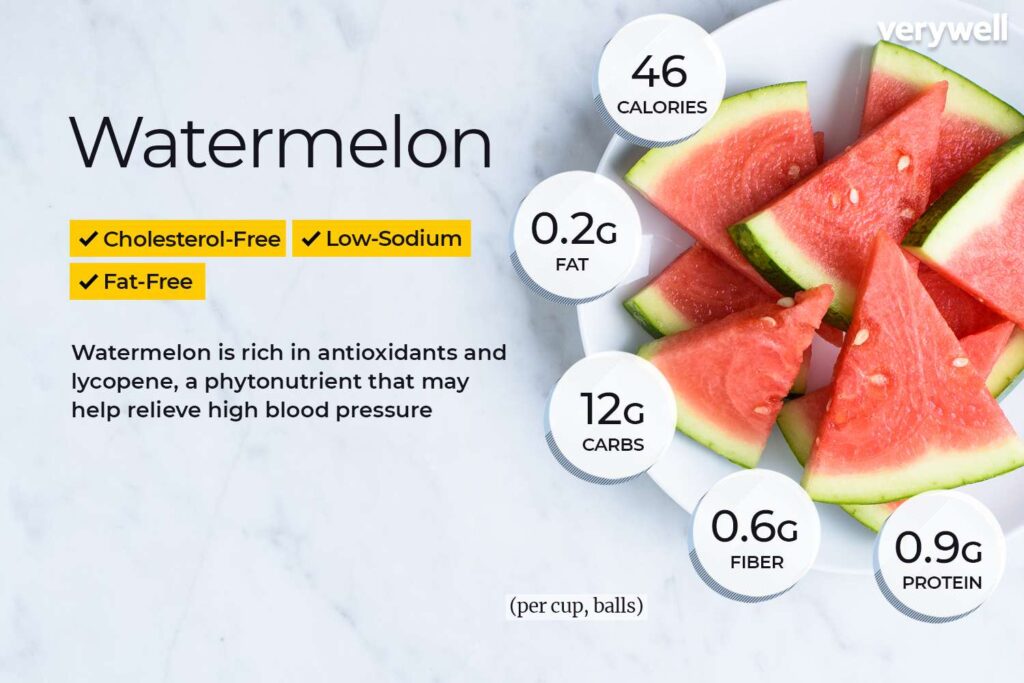
Things used
- 500 grams of watermelon
- 1 tablespoon of lemon juice
- Six or seven ice cubes
How it works
- Cut the watermelon in half and use a spoon to get the pulp out of one half.
- For one minute, blend the pulp.
- To make it taste better, add lemon juice.
- To make the juice smooth, strain it through a sieve.
- Pour the juice into a glass or jug and add ice cubes. You can now drink watermelon juice whenever you want.
- Curry with Watermelon
Things used
- 4 cups of watermelon cubes
- One and a half teaspoons of red chili powder
- 1/4 teaspoon of turmeric powder
- 1/4 teaspoon of cumin powder
- Half a piece of fresh garlic
- 1/4 cup of coconut milk
- Lime juice: 1 tablespoon
How it works
- Add 1 cup of watermelon, red chili, turmeric, coriander, cumin, and garlic to a blender and set it on high.
- Put the liquid in a pan.
- Wait until the puree starts to boil.
- For five minutes, let it cook slowly. Then, add the coconut milk and lime juice.
- Add the last three cups of watermelon cubes and slowly heat the mixture up.
- After five more minutes, your tasty watermelon curry is ready to be served with rice.
- Watermelon salad
Things used
- 500 grams of watermelon
- 1 Onion, Medium Size
- 1 Avocado
- A few leaves of basil and mint
- Two tablespoons of olive oil
- 100 grams of feta cheese
- 3 tablespoons of lime juice
- Salt: ¼ teaspoon
How it works
- Peel and cut the avocado, cucumber, and onion.
- Use a bowl to make the dressing. Add the olive oil, salt, and lemon juice, and mix them together.
- Put the cucumber, onion, avocado, and watermelon on a big plate.
- Spread half of the sauce over the things on the plate.
- Put basil and mint leaves on top of the feta.
- Finally, drizzle the rest of the sauce over the salad. Your tasty watermelon salad is now ready to be served.
How important it is to have health insurance
Eating well is one thing, but keeping healthy is something else. With this in mind, it is very important to always make sure you have enough money.
Buy mediclaim insurance. It’s one of the best ways to protect yourself and your family. With Tata AIG’s family health insurance plans, you can cover everyone in your family with just one plan.
Our family health insurance plans cover almost everything you need, including ambulance coverage, AYUSH benefits, cashless service, tax benefits (up to 1.5 lakhs), and a no-claim bonus. You can get good medical care at a low cost because we’ll pay for most of your medical bills.
This isn’t the only kind of insurance that Tata AIG gives. They also have personal accident insurance, critical health insurance, and many more.
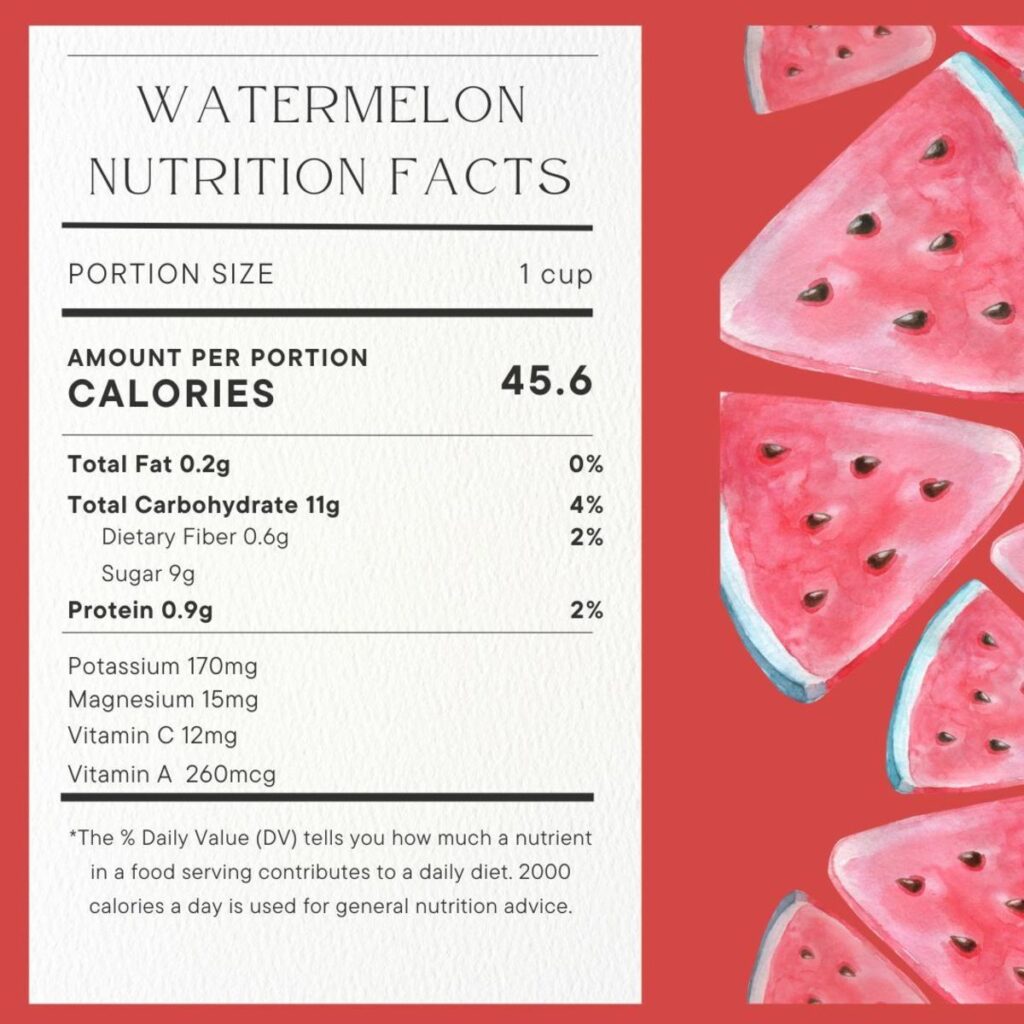
Should the seeds be taken out of a watermelon?
Watermelon seeds are safe to eat. They won’t hurt you and won’t make anything “grow” in your stomach. Some people like to spit out the seeds while they eat, while others just eat the flesh and seeds together to save time. Look for types that don’t have seeds if you don’t want to deal with them at all.
The only difference between watermelons with seeds and watermelons without seeds in terms of nutrition is how they are grown. Watermelons without seeds are made with different amounts of female and male flower chromosomes, which makes the fruit unable to reproduce. So, the seedless watermelon can’t make any seeds, as its name suggests. Watermelon without seeds is not genetically changed, despite what most people think. When you eat watermelon flesh without seeds, you’ll still get the same health benefits as when you eat watermelon flesh with seeds.
In short
When eaten in moderation, watermelon is good for most people, even those with diabetes, because it keeps you hydrated. Some studies show that it may even be good for your heart by cutting cholesterol and blood pressure. You can enjoy watermelon in a lot of different ways, from meals to frozen treats. For even more ease, try eating this famous summer fruit when it gets hot. Your taste buds and maybe even your ticker will thank you.


